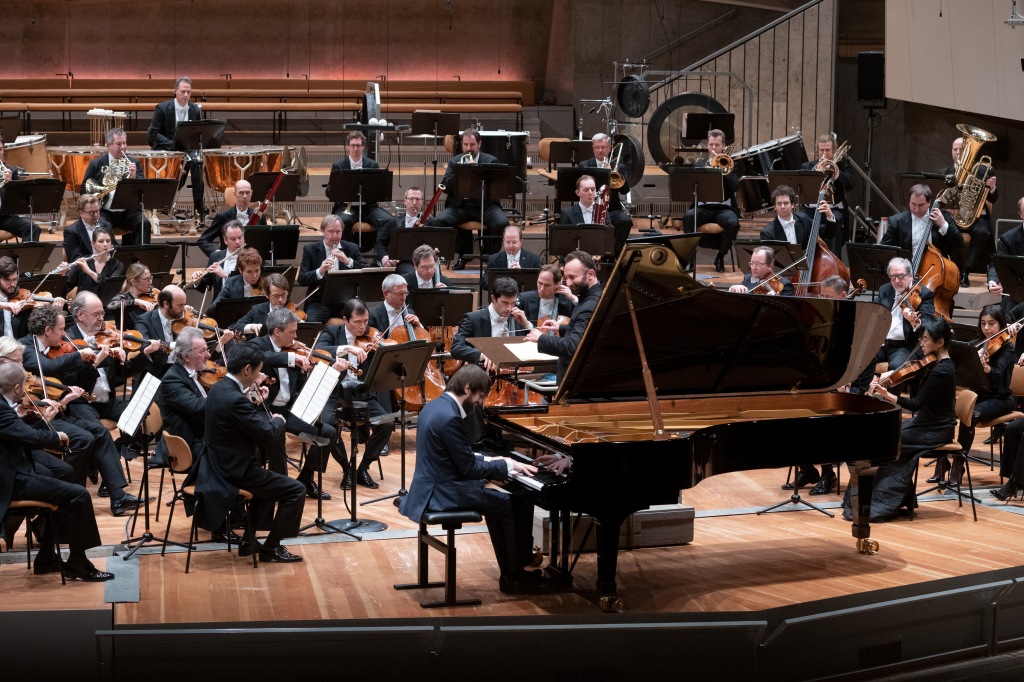
While concert halls in Germany too remain closed for audiences, Berliner Philharmoniker and their Chief Conductor Kirill Petrenko have launched their spring season on their online platform, the Digital Concert Hall.
This week’s programme opened with a long-awaited premiere of the new orchestral piece by Anna Thorvaldsdottir, jointly commissioned by the Stiftung Berliner Philharmoniker, New York Philharmonic, City of Birmingham Symphony Orchestra and Iceland Symphony Orchestra.
In her programme note, the composer describes Catamorphosis as a meditation on the fragile relationship we have to our planet.
”The core inspiration provides the initial energy and structural elements to a piece and then the music starts to breathe on its own and expand. In Catamorphosis this point in the process became more apparent and tangible as it aligned with an event that has had such dramatic impact on our lives and reality.”
Written during the pandemic, the topics reflected by Catamorphosis bear both acuteness and longevity.
”Catamorphosis is quite a dramatic piece, but it is also full of hope – perhaps somewhere between the natural and the unnatural, between utopia and dystopia, we can gain perspective and find balance within and with the world around us”, the composer summarizes in her note.
Scored for a large orchestra of triple winds, brass, harp, piano, an extended percussion section calling forth four players, as well as full strings, with various divisi, Catamorphosis is clad in ever-transforming sonorities. Both conventional and extended playing techniques are used throughout the score, ever in the most imaginative and natural ways.
The twenty-minute score is divided into seven sections, played attacca and bearing reflective titles: Origin, Emergence, Polarity, Hope, Requiem, Potentia and Evaporation.
On the opening page, the music begins to take shape and hue with percussion, harp and piano, played both from inside and on the keyboard. Pedal points from contrabassoon and bass tuba appear, paving the way for the full orchestra.
As the opening arch of Origin finishes full circle, and the music flows into the second section. In Emergence, apparitions of musical patterns begin to materialize, and the orchestral dramaturgy builds up to Polarity and its contrasting subjects.
As the music permutes through Hope, Requiem and Potentia, sonic tapestries of gripping ambivalence unfold, enthralling the listener with their subtle intensity and compelling dramaturgy.
Catamorphosis closes with Evaporation, a two-page coda bearing two rising gestures, one for winds and the other for things, followed by final, resonating sounds from piano, harp and percussion.
Performed with dedication and detail by the Berliner Philharmoniker and Petrenko, Catmorphosis was given a wonderfully reflective first performance. With myriad of textures and sonic colour, all clad in translucent fabric, the score was transformed into powerful sonic reality.
Both elusive and intensely communicative, Catamorphosis is a compelling work. In the manner of Sibelius’s Tapiola (1926), Thorvaldsdottir’s score encapsulates an entire universe within its twenty-minute arch.
Based on the gripping online premiere, one can but imagine the full sonic scope of the in-hall performance. Hopefully its next performances, coming up in April at the Harpa Concert Hall in Reykjavik, live audiences are again permitted.
Written in 1911-12, Sergei Prokofiev’s Piano Concerto No. 1 in D flat major, Op. 10 may inhabit a musical real somewhat different to Thorcaldsdottir’s Catamoprhosis, but both works share a one-movement structure, subdivided into joint sections.
Premiered in Moscow in the summer of 1912, with the composer as soloist, the fifteen-minute concerto has since become a repertoire piece, enjoying numerous outings with remarkable performers.
While it would be temptingly easy to pigeon-hole the concerto as showy juvenilia, there is more to the score than its pianistic brilliance, especially on the hands Daniil Trifonov, who appeared as soloist on Friday evening’s programme.
Insightful, witty and engaged, the concert came off fresh and anew with Trifonov, the orchestra and Petrenko. Ebbing and flowing between caustic sarcasm and undiluted lyricism, Prokofiev’s excellent musical imagination was indeed well served by the performance.
More than usual, this marvellous performance succeeded in bringing out those darker-hued undercurrents, often covered by the sounding surface, both in the solo part and within the orchestral textures, without distorting the concerto’s essential brilliance.

Originally, this week’s programme was to conclude with Erich Wolfgang Korngold’s Symphony in F sharp, Op. 40 (1947-52) for large orchestra. After some reshuffling, the symphony was replaced with another 20th century orchestral rarity, Josef Suk’s five-movement tone poem A Summer’s Tale, Op. 29(Pohádka léta, 1907-09).
An intriguing mixture of melodic flow, elaborate counterpoint and beguilingly advanced harmonies, A Summer’s Tale bears family resemblance with Dvořák and Janáček, at least to some degree, while also absorbing musical idioms akin to Debussy.
Out of these diverse ingredients, Suk devises a tone poem in the manner of a dramatic symphony à la Berlioz, clad in evocativeness, heartbreaking lyricism, nightmare and consolation.
One of the most prominent champion’s of the Suk oeuvre, Petrenko knows the score inside out, having studied, performed and recorded the music during his Komische Oper years in Berlin. In contrast, the Friday evening performance was the first outing of the score by the Berliner Philharmoniker.
With Petrenko’s insight combined with the orchestra’s peerless sonic tradition, A Summer’s Tale was given a tremendous performance. Ablaze with colour, yet fabulously transparent, Suk’s orchestral canvas unfolded in splendidly captivating manner, resulting in an uplifting symphonic experience.
As storytellers, Petrenko and the Berliner Philharmoniker guided the listener through a series of invigorating soundscapes, providing the evening a worthy conclusion.
Berliner Philharmoniker
Kirill Petrenko, conductor
Daniil Trifonov, piano
Anna Throvaldsdottir: Catamorphosis (2020) for large orchestra (world premiere)
Sergei Prokofiev: Piano Concerto No. 1 in D flat Major, Op. 10 (1911-12)
Josef Suk: A Summer’s Tale, Op. 29 (1907-09) – tone poem for orchestra
Philharmonie Berlin (via Digital Concert Hall)
Friday 29 January, 8 pm (CET)
© Jari Kallio
Leave a comment